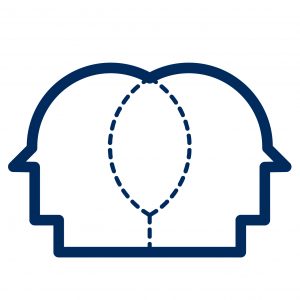 Written By: Betelehem Gulilat, Content Writer
Written By: Betelehem Gulilat, Content Writer
Contributors: Shankeri Vijayakumar (UTQAP Research Coordinator), Lidiia Tulenkova and Maliha Sarwar (Design Researchers)
Have you ever felt something is holding you back from success? At one point or another we all have stumbled into a roadblock but how we face them is where the answer may lie.
Our lovely team members from the Innovation Hub, Shankeri, Lidiia and Maliha, share their stories on how our ability to achieve success is something we can all develop and what determines how we achieve success is largely based on our mindset.
Failure and adversity can be thought of differently from one person to the next. While some believe our capabilities are finite and limited, others believe anyone can achieve success through learning and hard work. The idea that success can be cultivated through our mindset has long been studied and defined by Stanford psychologist, Carol Dweck (2006). After decades of studying this topic and working with students in the learning environment, she found that one’s mindset is a determining factor in how we cope with adversity.
The Impact of a Growth Mindset
A growth mindset, as described by Dweck, is the mindset of believing your talents can be developed through hard work and input from others. Adopting this way of thinking allows us to respond to setbacks and criticism with curiosity and learning of new ways of doing. It is important to foster spaces for a growth mindset, especially in classroom and work environments, by providing feedback that is more process-focused and less talent-focused.
Design thinking is a fitting example of how a challenge can ultimately lead to success, and more specifically innovation. At the Innovation Hub (iHub), we champion a growth mindset, especially in our nature of work that involves diverse ideas, collaboration, and multiple iterations to get to our finalized design principles and solutions.
We asked our team members to reflect on how a growth mindset has impacted their work thus far and below are their experiences and main takeaways.
Shankeri, UTQAP Research Coordinator
 “I always strive to bring a growth mindset to any work that I do… my thoughts on a growth mindset, especially in the context of research, has definitely evolved since working at the Innovation Hub…I realized how complementary a growth mindset is to the iterative nature of qualitative and design research… Rather than seeing research as an end goal of uncovering certain findings, a growth mindset can help you value the journey the research process takes you on. This includes welcoming the opportunities to refine your research aims, allow stories to evolve your initial thoughts on your research, and incorporate feedback from peers into your data analysis. This reinforces the iterative nature of research not as something involving setbacks, but as a learning process with opportunities to produce stronger research and become a stronger researcher.”
“I always strive to bring a growth mindset to any work that I do… my thoughts on a growth mindset, especially in the context of research, has definitely evolved since working at the Innovation Hub…I realized how complementary a growth mindset is to the iterative nature of qualitative and design research… Rather than seeing research as an end goal of uncovering certain findings, a growth mindset can help you value the journey the research process takes you on. This includes welcoming the opportunities to refine your research aims, allow stories to evolve your initial thoughts on your research, and incorporate feedback from peers into your data analysis. This reinforces the iterative nature of research not as something involving setbacks, but as a learning process with opportunities to produce stronger research and become a stronger researcher.”
Lidiia, Design Researcher for UTQAP
 “Once you are hired for any of the positions in the industry, you might think of it as a “terminal point”, achievement, the final step that you made after your journey of working hard to develop the needed skillset for your success. However, it is only the beginning. I tend to believe I am a person with a growth mindset, and since working at the Innovation Hub, I found confirmation to the words of my iHub colleague that “there is always space for growth”. For example, it would seem, with my experience in hosting the countless number of interviews in the past several years, how can this be improved further? Yet, the weekly teachings and practice in design research at the iHub taught me numerous nuances in the approach to empathy-based interviewing, including the development of my skill of being open-minded, abandoning your biases, and reading in between the lines of what the interviewee is saying.”
“Once you are hired for any of the positions in the industry, you might think of it as a “terminal point”, achievement, the final step that you made after your journey of working hard to develop the needed skillset for your success. However, it is only the beginning. I tend to believe I am a person with a growth mindset, and since working at the Innovation Hub, I found confirmation to the words of my iHub colleague that “there is always space for growth”. For example, it would seem, with my experience in hosting the countless number of interviews in the past several years, how can this be improved further? Yet, the weekly teachings and practice in design research at the iHub taught me numerous nuances in the approach to empathy-based interviewing, including the development of my skill of being open-minded, abandoning your biases, and reading in between the lines of what the interviewee is saying.”
Maliha, Design Researcher for Campus Safety
 “As a design researcher we are constantly encountering new and exciting challenges in our work. In my experience, if you start the work thinking you have the solution, you’re never going to find it. You must look at the situation from many different angles using the diverse skills of those around you. Being able to incorporate feedback while learning new things in the process is what makes all the difference in solving the “wicked problems” we take on, which makes having a growth mindset throughout the whole process so key.”
“As a design researcher we are constantly encountering new and exciting challenges in our work. In my experience, if you start the work thinking you have the solution, you’re never going to find it. You must look at the situation from many different angles using the diverse skills of those around you. Being able to incorporate feedback while learning new things in the process is what makes all the difference in solving the “wicked problems” we take on, which makes having a growth mindset throughout the whole process so key.”
It is important to note that a growth mindset is not something you simply have or don’t. Everyone has a fixed and growth mindset in one area of their lives or another. Mindsets are a learning process and developed over time. The growth mindset can be an enlightening journey that enriches your life, understanding of the world, and yourself.
If interested in learning more about a ‘Growth Mindset’:
Atkerson, B. (2021, April 28). How to cultivate a growth mindset even if you feel stuck. Medium. Retrieved February 25, 2022, from https://medium.com/the-confidence-plan/how-to-cultivate-a-growth-mindset-even-if-you-feel-stuck-cb68e612fbd5
Briceno, E. (2012, November 18). The power of belief – mindset and success. YouTube. Retrieved February 25, 2022, from https://www.youtube.com/watch?v=pN34FNbOKXc
References
Dweck, C. (2021, December 8). What having a “growth mindset” actually means. Harvard Business Review. Retrieved February 25, 2022, from https://hbr.org/2016/01/what-having-a-growth-mindset-actually-means
0 comments on “Why Mindset Matters”